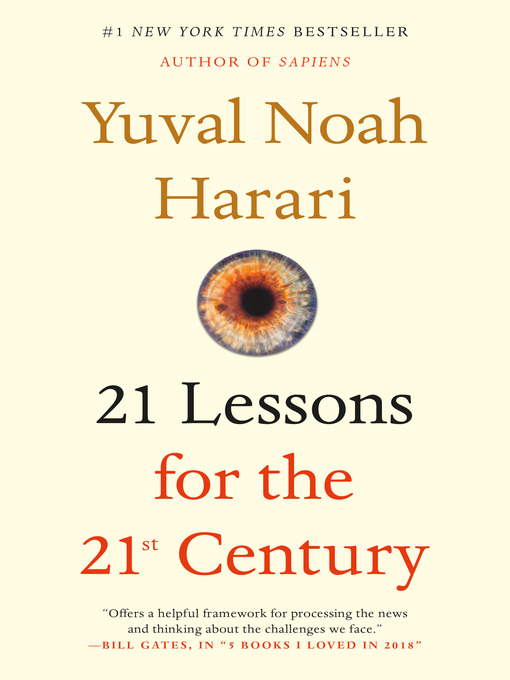
21 Lessons for the 21st Century
کتاب های مرتبط
- اطلاعات
- نقد و بررسی
- دیدگاه کاربران
نقد و بررسی

Starred review from June 25, 2018
Magnificently combining historical, scientific, political, and philosophical perspectives, Harari (Sapiens and Homo Deus), a Hebrew University of Jerusalem history professor, explores 21 of what he considers to be today’s “greatest challenges.” Despite the title’s reference to “lessons,” his tone is not prescriptive but exploratory, seeking to provoke debate without offering definitive solutions. An early chapter is headlined with the lesson, “When You Grow Up, You Might Not Have a Job.” Not only will many jobs be lost to machines, but, Harari speculates, humans might not even be necessary to fulfill the role of consumers: “Theoretically, you can have an economy in which a mining corporation produces and sells iron to a robotics corporation, and the robotics corporation produces and sells robots to the mining corporation.” A chapter beginning with the lesson “Those Who Own the Data Own the Future” discusses how the improved human understanding of mind and brain, and the ability to manipulate both, raises the threat of control by those with access to one’s data, making the regulation of data ownership perhaps “the most important political question of our era.” Within this broad construct, Harari discusses many pressing issues, including problems associated with liberal democracy, nationalism, immigration, and religion. This well-informed and searching book is one to be savored and widely discussed.

July 15, 2018
A highly instructive exploration of "current affairs and...the immediate future of human societies."Having produced an international bestseller about human origins (Sapiens, 2015, etc.) and avoided the sophomore jinx writing about our destiny (Homo Deus, 2017), Harari (History/Hebrew Univ. of Jerusalem) proves that he has not lost his touch, casting a brilliantly insightful eye on today's myriad crises, from Trump to terrorism, Brexit to big data. As the author emphasizes, "humans think in stories rather than in facts, numbers, or equations, and the simpler the story, the better. Every person, group, and nation has its own tales and myths." Three grand stories once predicted the future. World War II eliminated the fascist story but stimulated communism for a few decades until its collapse. The liberal story--think democracy, free markets, and globalism--reigned supreme for a decade until the 20th-century nasties--dictators, populists, and nationalists--came back in style. They promote jingoism over international cooperation, vilify the opposition, demonize immigrants and rival nations, and then win elections. "A bit like the Soviet elites in the 1980s," writes Harari, "liberals don't understand how history deviates from its preordained course, and they lack an alternative prism through which to interpret reality." The author certainly understands, and in 21 painfully astute essays, he delivers his take on where our increasingly "post-truth" world is headed. Human ingenuity, which enables us to control the outside world, may soon re-engineer our insides, extend life, and guide our thoughts. Science-fiction movies get the future wrong, if only because they have happy endings. Most readers will find Harari's narrative deliciously reasonable, including his explanation of the stories (not actually true but rational) of those who elect dictators, populists, and nationalists. His remedies for wildly disruptive technology (biotech, infotech) and its consequences (climate change, mass unemployment) ring true, provided nations act with more good sense than they have shown throughout history.Harari delivers yet another tour de force.
COPYRIGHT(2018) Kirkus Reviews, ALL RIGHTS RESERVED.

September 1, 2018
Having achieved worldwide success canvasing humanity's past and future, Harari (world history, Hebrew Univ. of Jerusalem.; Sapiens: A Brief History of Humankind) now turns his insightful gaze to the problems of the present day. In this timely, lucid volume, Harari tackles major global challenges from the conquest of the algorithm and the impending loss of free will to our quest to find political and intellectual stability in a posttruth world. Along the way, the author eschews any bold claim-making in the way of solutions, instead focusing on defining the most pertinent questions humanity faces today. Many of these questions involve the educational and economic response to automation, the political ramifications of the forces of nationalism in the face of immigration, and the continued push of Enlightenment against the imposing wall of ignorance and superstition. However, reiterating previous prognostications for the conquest of liberalism, Harari questions current political arrangements to solve the issues at hand and in our immediate future. VERDICT Readers of Harari's previous works will find this volume uniquely engaging in its application of those larger contours of history and future to contemporary society. Highly recommended for general readers and academics alike.--Brian Odom, Madison, AL
Copyright 2018 Library Journal, LLC Used with permission.

























دیدگاه کاربران